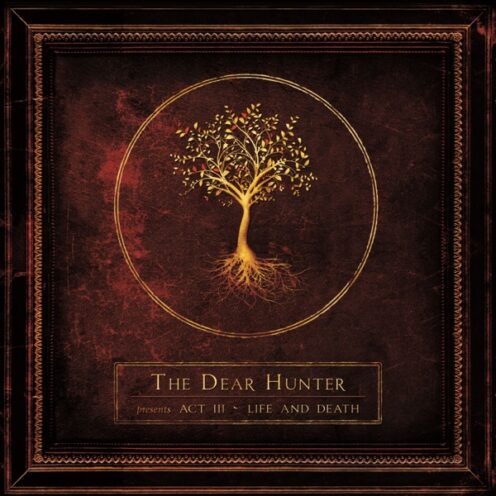
So here we are – halfway through the sprawling six-volume epic of The Dear Hunter, and the road has been anything but smooth. After the universally adored Act II came out and gained traction in the scene, the band was almost dismantled by the departure of three members, leaving the future of the band and its opus in clouded doubt. Thankfully for fans, Casey Crescenzo is persistent to the greatest degree, and along with Erick Serna, rebuilt The Dear Hunter to rise again.
One might think that with this discord and splintering, the work of The Dear Hunter might suffer in kind, but such is not the case. If anything, Act III: Life and Death ends up being a much more focused, coherent offering, and exhibits no signs of faltering or lost momentum. Whereas Act II: The Meaning Of & All Things Regarding Ms. Leading was the progeny of the band experimenting across the entire sonic spectrum, Act III is the sound of a band finding their sound, and honing it to a fine point. Act II was lauded for its diversity, but Act III almost makes it sound disconnected in comparison. Act II was almost certainly the band (and Casey) finding itself, and Act III is the first revelation of the growth to come from said self-awareness.
Starting off with a haunting manifold vocal arrangement a la Act I’s “Battesimo del Fuoco,” the third act wastes no time in creating a tangible sense of place. As the a capella montage rolls smoothly into TDH’s trademark ragtime/jazz/prog blend, the record and story begins to unfurl – first slowly on the remainder of the album’s opener, then blisteringly so on “In Cauda Venenum” (meaning literally “the poison (is) in the tail” or “save the worst for last”). Replete with horns, blasting guitars, and a free clinic in percussion, it is the edgier, angrier Dear Hunter that first surfaced on Act II’s barn-burning “Dear Ms. Leading,” and it grabs its listener right from the start with an ideal mix of energy and intricacy. The same holds for the exhausting “The Tank,” which is arguably the most operatic and theatrical track released this year, and the swing/bluegrass hybrid of “Go Get Your Gun.”
Of course, given the band’s track record, it should come as little surprise that the band can construct sizzling, vigorous numbers. But Casey and crew prove that “Black Sandy Beaches” and “Red Hands” were not its only downtrodden bull’s-eyes, as they strike gold once again with the gorgeous “Saved,” which blooms in disarming fashion to a meticulously arranged vocal coda. Other slow numbers, while effective in carrying the story, however, are less musically engaging (see: “Father” and “Life and Death”). That said about the fast and slow, there is a lot to love in the midtempo of Act III, with noteworthy tracks including the dramatic “What It Means To Be Alone,” the familiar anachronistic piano pop of “The Poison Woman,” the dreamy expanse of “The Thief,” the schizophrenic “Mustard Gas,” and the self-assured swagger of “He Said He Had a Story.” Quite a bit of meat and potatoes, and certainly enough to overwhelm the record’s minor stumbling blocks.
In a vacuum, Act III is impressive in its own right, and is perhaps even more so when viewed in the context of The Dear Hunter’s progression to get to this point. While it was evident on Act II that Casey had evolved considerably as a vocalist, he again trumps his prior work here, and delivers some of his most impressive and memorable performances to date, expanding in both range and confidence, which really gives the songs that extra quality of immersion. Likewise, the self-production on Life and Death showcases an ever-developing wizardry behind the boards, and Mike Watts’ perfect mixing is just icing on the cake, turning out to be an excellent elective for the band.
Overall, The Dear Hunter’s Act III: Life and Death might sound a little less fresh than its predecessors, and is less likely to corral new fans like Act II did, but that is not necessarily to say it is an inferior product. In fact, Act III is certainly more mature, more focused, and more assured. The collection carries the story skillfully, and leaves the literary-minded listener waiting for more. It is the type of growth that makes the Boston-based troupe sound less like a post-hardcore “scene” band, and helps them fill the shoes their ambitions have always aspired to. Act III is definitely not the big step up some people might have expected, but it is undoubtedly a step in the right direction.
 Mustard Gas
Mustard Gas